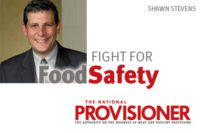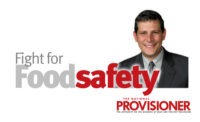With the numbers of monthly recalls for pathogen contamination and undeclared allergens growing, more and more food processors are buying recall insurance to cover that potential threat. Food processors should be warned, however, that they may want to consider recalling their insurance policy. This is because insurance companies in many cases are selling recall insurance with fine print that doesn’t provide the coverage they promised, or by finding ways to argue that they don’t have to provide coverage even when the policy they provided expressly requires it.
If the right recall insurance (with the right insurer) can be found, however, it is definitely worth it. Although, in some cases, food product recalls can be adequately contained and controlled, in many cases they can be quite catastrophic. In every case, a recall will be followed by significant regulatory action. In many cases, and depending upon the severity of the underlying issue, FSIS will either threaten to shut a facility down or actually do it until the agency’s concerns are adequately addressed. As you can imagine, the financial impact on any company under these circumstances can be devastating. In some cases, a single recall can force even the strongest companies out of business.
Moreover, in addition to attempting to survive the immediate aftermath and cost associated with a recall, a food processor may also be faced with significant customer claims or even lawsuits relating to their customers’ alleged lost profits or damage to their brand. In the event of an unintended recall, having adequate recall and business interruption insurance in place can make the difference between continuing prosperity or shutting the doors forever.
Because insurance companies are getting very good at taking advantage of their customers, you should be extremely cautious when pricing and then buying insurance. Whether you are buying insurance (or have already purchased insurance), study the policy closely to make sure that there are no exclusions or fine print that will allow the insurance company to argue that you are not entitled to coverage in the event of a recall. Also, consider reaching out to others in the industry who have experienced recalls, and asking how their own insurance company responded, and whether they have any regrets, advice or suggestions. I deal with many of these companies and insurers as well, and have a good sense of which insurance providers will (and which will not) honor their obligations. In every case, the most important key is to have all your questions or concerns adequately satisfied before signing on the dotted line.
With the federal government and our customers continuously scrutinizing the quality of our food, it is critically important that you scrutinize the quality of your insurance. If it’s not up to par, consider recalling your insurance, and finding a different insurance supplier.
Shawn K. Stevens defends and counsels meat companies in foodborne illness matters throughout the United States. Mr. Stevens also assists industry clients with regulatory compliance, recall planning, crisis management and other issues in advance of and following major food-product recalls. Additional information about his practice can be found at www.defendingfoodsafety.com.




Report Abusive Comment